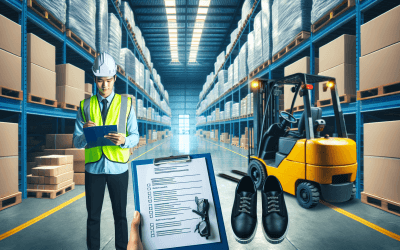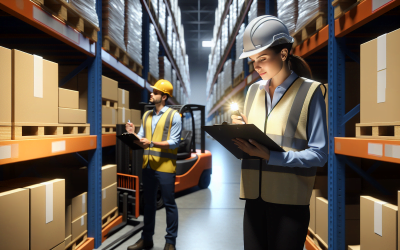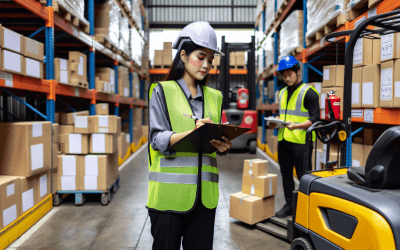Implementing a safety observation program is crucial for any warehouse operation. It helps...
Keep your team safe and your facility compliant with a safety assessment.
Warehouse Safety Evaluation
People – Equipment – Workflow

Warehouse safety evaluation is a proactive service that helps identify hazards, prevent injuries, and ensure your facility meets safety regulations. It’s designed for warehouse managers, safety officers, and operations leaders responsible for protecting teams and maintaining compliance.
We conduct on-site assessments focused on the real-world risks found in warehouse environments. Our evaluations cover key areas such as:
- Forklift and pedestrian traffic flow
- Racking and shelving stability
- Emergency exits and evacuation routes
- Proper signage and safety labeling
- General OSHA and industry-specific compliance
Whether you’re preparing for an audit or improving safety practices, this service provides the insights needed to create a safer, more efficient warehouse.
Comprehensive Warehouse Safety Assessments to Reduce Risk and Ensure Compliance
Identify Workplace Hazards
Protect Employees and Prevent Incidents
Achieve Regulatory Compliance
Learn More From Our Blog
Lean Warehousing: Maximizing Efficiency and Minimizing Waste
In today's highly competitive market, efficient warehouse management is crucial for businesses...
How to Conduct a Comprehensive Warehouse Safety Inspection
Warehouse work isn’t glamorous. It’s loud. Fast. Heavy. People are on their feet all day, dodging...
How to Conduct a Warehouse Safety Audit
Some warehouses feel safe. Others feel like accidents waiting to happen. The difference isn’t...
How to Improve Warehouse Safety with Regular Evaluations
Warehouses are built for speed and volume—but that only works if the place stays safe. A single...
The Ultimate Guide to Warehouse Safety Evaluations
When it comes to managing a warehouse, safety isn't something that should sit on the back burner....
Why Choose HCO Innovations for Warehouse Safety Evaluation?
At HCO Innovations, we take warehouse safety seriously. Our team combines decades of operational experience with expert knowledge of safety regulations to deliver in-depth evaluations you can trust. We don’t just point out issues—we provide practical, cost-effective solutions that enhance safety without disrupting productivity.
- Detailed safety inspections based on OSHA and industry standards
- Custom risk assessment reports with prioritized recommendations
- Focus on real-world hazards like traffic flow, signage, and racking stability
- Support for internal audits, compliance goals, and insurance requirements
- Hands-on guidance to help you implement lasting safety improvements
Whether you’re preparing for an audit or proactively working to improve safety, HCO Innovations delivers the insights and expertise your team needs to succeed.








